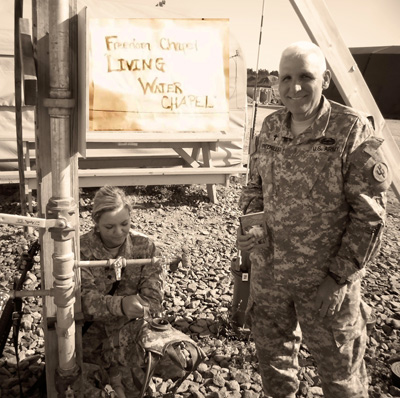By Fr. Bill Kneemiller

I am on a bus going to Fort McCoy for annual training for reserve soldiers. Thousands of soldiers will converge here for their mandatory two to three weeks of summer training. Initially, I am feeling conflicted about this duty, coming in the middle of a new assignment to four parishes located northwest of Davenport. “How can I do everything?” I think, as the scenic Wisconsin countryside flies by the bus window. I make light conversation with the half-dozen soldiers around me.
“Hey guys” I say, “Have you ever heard of green smoothies made with kale?” “This last week I was drinking one each day.” “Kale?” says the master sergeant next to me. “Isn’t that like seaweed?” I reply, “No, that’s kelp; kale is a green, cruciferous vegetable, with about double the vitamins and minerals of spinach or broccoli.”
A PVT2 (private) with an iPhone googles “cruciferous” and says, “Hey, Chaplain — ‘cruciferous’ means ‘Four petals shaped like a cross;’ no wonder you like that word!” I go on to explain that I am fanatical about green smoothies right now because I drank them for a week and my energy level nearly doubled. I conclude with, “Hey guys, just read the book ‘Green For Life,’ or get the Netflix ‘Fat, Sick & Nearly Dead,’ which talks about green smoothies.”
My newfound energy will be much needed, I soon learn. After our unit arrives at Fort McCoy in Wisconsin, I get a call to meet with the base chaplains. I am informed that among the 14 chaplains here with their units for the 4,000-soldier exercise, I am the only Catholic chaplain on base. Never before have I seen a Baptist or evangelical chaplain so happy to see a Catholic priest. I am told, “Chaplain Kneemiller, we need you to travel to all seven field bases to provide a Mass for our Catholic soldiers.”
In the next three weeks, most of the soldiers will not leave their field bases for the duration of the exercise. This will be their only chance to attend Mass, and I am happy to offer confession/reconciliation times as this is a stressful time for soldiers being away from home.
Days later I get to meet with the base commander — a one-star general — and am impressed that he asks us to pray for him and the soldiers he serves. The general encourages the chaplains to be proactive and meet with soldiers before their problems get more serious. Also, out on the field, since I am now a major rank, I get to supervise the chaplains around me. One is a Latter Day Saint (Mormon) and one is a North American Baptist. The Baptist chaplain loves Scripture and is more than happy to join me in praying the morning Liturgy of the Hours.
One other little story: In our field chapel we are about 10 feet away from the water point — the place where every soldier comes to fill up his canteen or water pack every day. I realize the connection of the water point with the chapel. So I ask the chaplain assistant to make a sign, “Chapel of the Living Water,” visible to all the soldiers as they fill their water containers. This image from the Gospel of John will take on special meaning for me in the coming days. In the morning Office readings, St. Ignatius of Antioch mentions this symbolism on his way to martyrdom. I also connect it with my newfound interest in health and well-being; I believe all these sources of our restoration come from the hand of our heavenly Father.
Jesus reminds us that God “sends the rain upon the just and the unjust,” and so I am reminded to give thanks for all good things that are given to us. I also believe that this can be summed up by calling the blessing God gives us “Prayer with the Heart.”
(Father Bill Kneemiller is a priest of the Davenport Diocese and chaplain in the U.S. Army Reserves. Effective June 29, he will be pastor of Ss. Philip & James Parish, Grand Mound; Sacred Heart Parish, Lost Nation; St. James Parish, Toronto; and, Sacred Heart Parish, Oxford Junction.)







